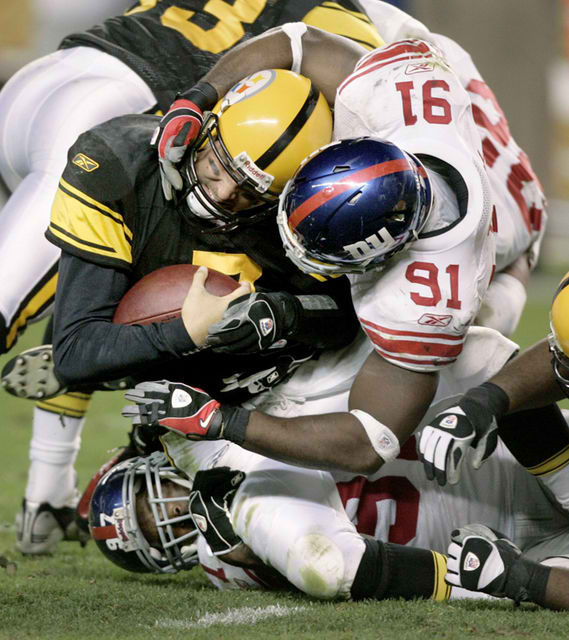I would think Brewers fans have a soft spot in their hearts for CC Sabathia, who in many ways carried the team to its 2008 Wild Card berth that ended 26 years in the playoff wilderness. We were proud of him when he won the 2009 World Series with the Yankees, and we welcomed him back in 2014 when he made his first Milwaukee start since leaving the Brewers. (It didn’t hurt that the Brewers won that game.) So I assume we felt sympathy for him when he announced last month he was checking into rehab for alcoholism.
Yesterday Sabathia gave an exclusive interview to Good Morning America about his struggle with alcohol addiction (video not embeddable, unfortunately). Sabathia was very candid that he’s had problems with alcohol for many years, although he says he never drank before a game. For Sabathia, the turning point was the Yankees’ final road series in Baltimore:
“It was the last day of the season,” Sabathia said. “That weekend I had kind of started drinking…[I] thought nobody was paying attention and, you know, I was isolated by myself–stayed in my room the whole weekend. I think it was October the 4th, Sunday and [I] woke up and just felt like I needed help.
“…it was a tough decision to make because I felt like I was leaving my teammates, but I definitely needed the help to be a better, you know, husband, father, teammate… player,” Sabathia added.
Sabathia’s family, teammates, and people throughout baseball have been supportive, and it sounds like he’s in a better place. But even if we sympathize with Sabathia and wish him the best, he said something in the interview—something that often comes up in discussions of addiction—that is worth exploring:
“I’m just here to say that this disease has no color,” Sabathia said of alcoholism.
“I advise anybody, if they’re out there, feeling like they need help, to get it,” Sabathia said.
Sabathia has apparently bought into the disease theory of alcoholism, and if that’s helpful for him then fair enough. But whether or not alcoholism and other addictions should be viewed as diseases is a matter of contention.
Without even researching medical literature, I think most lay people have a sense that addiction is something serious, but not quite the same as a disease. I used to smoke cigarettes, something that almost 18% of Americans currently do. I can’t imagine any current or former smokers saying they have/had a disease. It’s an addiction—and a bloody difficult one to overcome at that—but to characterize cigarette smoking as a disease would be a hard argument to make. Why is it common to call addiction to alcohol a disease, but not addiction to cigarettes? Seems arbitrary.
It’s clear there is a neurological component to alcoholism: “…it suppresses the excitatory neurotransmitter glutamate and increases the inhibitory neurotransmitter GABA.” There are physical symptoms of withdrawal from certain substances, including alcohol. Some studies have suggested a genetic tendency toward alcoholism. These biological factors make alcoholism appear to be a disease, but there are serious arguments that addiction has very little in common with diseases:
[Addiction] is a group of behaviors, not an illness on its own. It cannot be explained by any disease process. Perhaps worst of all, calling addiction a “disease” interferes with exploring or accepting new understandings of the nature of addiction.This becomes clear if you compare addiction with true diseases. In addiction there is no infectious agent (as in tuberculosis), no pathological biological process (as in diabetes), and no biologically degenerative condition (as in Alzheimer’s disease). The only “disease-like” aspect of addiction is that if people do not deal with it, their lives tend to get worse. That’s true of lots of things in life that are not diseases; it doesn’t tell us anything about the nature of the problem.
To say addiction is not a disease is not to say people struggling with addiction do not deserve help or should be stigmatized. One of the reasons the disease theory of alcoholism became accepted decades ago was because folks with drinking problems were viewed as morally degenerate. Characterizing alcoholism as a disease made it easier for these troubled individuals to find acceptance and ultimately get help. We wouldn’t want to go back to treating people with addictions as simply immoral, lazy, or weak. But we might ask ourselves if labeling addiction as a disease has negative unintended consequences.
If you have a disease, you might well believe there is nothing you can do to help yourself—you are “diseased” and have lost your sense of agency. That could be a barrier to recovery. On the other hand, if alcoholism is really a choice, not a disease, a lot of alcoholics would feel empowered to put themselves on a path to recovery.
In addition, researchers looking to “cure” the disease of addiction might narrowly focus on biological factors (particular brain cells) without looking at cultural factors. That also could be an obstacle to understanding the true nature of addiction and learning how to help people.
Although there is a lot we don’t know about addiction, it seems safe to say that it affects all individuals differently. Sabathia says he never drank before a game, but some alcoholics are so dependent that drinking does interfere with their professional lives. How people recover from their addictions is also a highly individual matter. Viewing alcoholism as a disease may work for Sabathia, but it might not work for others. That being the case, maybe it’s worth re-examining how valuable it is to classify alcoholism as a disease for everyone.
(Image: Good Morning America)
Add The Sports Daily to your Google News Feed!
